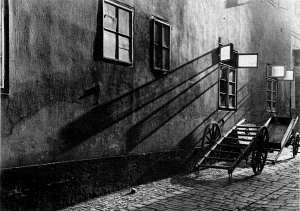More than 30 years ago many militants from armed groups took a train and left from Italy. In the latest ’80s a good number of them arrived in France, being the first of the waves of those who had the urgency to put as many kilometers as possible between them and Italy, where repression was striking hard.
After that first sigh of relief many others followed with every rejected extradition request and with every granted provisional freedom decree.
Actually, as time passed by, we started to believe that Francois Mitterrand would keep his word. The group of Italians, hardly a community, was growing larger, inventing new forms of survival, betting their future on an informal declaration. All around solidarity was sprouting in the host nation, where the vicissitudes of Italy were followed closely, included the authoritarian drift that the Italian society was taking.
Years of dead calm alternated with charged up arrests, and Italians started to head towards the courthouses, signed by the passing time which left on them bags under their eyes, white hairs and enlarged waistline. In 1988 Europe came into the scene with the Schengen agreement and three arrest warrants were issued, waking up the Italian refugees. And the history repeats: prisons, solidarity, courthouses and, finally, another, louder, sigh of relief for the release of the three arrested and the issue of tens of residency permits, that up to then had always been denied by the prefecture.
It was possible to go back to a normal life. But on the other side of the border they were adjusting the aim. The press contributed giving a semblance of legitimacy to a bunch of clichés about Italian refugees in France (and not only in France), transforming a collective story into a pulp-tragedy.
Actually, the Italian refugees became a matter of interest only in times of emergency. And this was the situation until the extradition of Paolo Persichetti, when many different solidarity actions added to the spontaneous solidarity of his university colleagues. The main reaction was incredulity: after twenty years had passed, the Italian refugees issue was once again drawn out. Then it was the time of Cesare Battisti, and then Marina Petrella. Not to mention the shameful extradition of Rita Algranati from Algeria. The opportunity that was offered in France, to live free preserving one’s memory, as safe as possible from pressures and blackmails, was once again called into question. Beyond the borders columnists and politicians once again pointed accusingly to France, the Leftists being often fiercer than the others. So much for the laity of the critique! This is the worse of the religious dogmatisms. There can be only one reason for this obstination: they don’t want to understand; they want to punish, to humiliate, to crush. Still it’s obscure what’s good in saving Italy from the “terrorism” threat just to
consign it to people as Berlusconi, Fini, Bossi…
Meanwhile those who still are free can only live in the present, suspended in a temporal limbo where past, present and future are undistinguished.
Those trains that brought to the shelter of the french land the exiles from the italian struggles are still at their binary, with their load of people, only half-safe and half-free. Those people want to get off those trains. One of them is ENRICO VILLIMBURGO. Enrico was a communist militant of the Roman division of the BR [Red Brigades, a communist underground armed party]. One of those whose sentence has no end. Now Enrico is ill and needs a support that his small group of comrades can grant him no more.
Enrico needs money for chemotherapy. Administrative and legal conditions of refugees in France does not allow them to use public health care. We therefore ask for economic contributions for those who wish to participate.
For more information contact
Cassa di Solidarietà Aracnide
aracnide ( at) autistici (dot) org
http://325.nostate.net/?p=10374#more-10374
